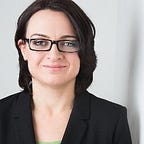Chicago — Home of the Cubs, Navy Pier, 26,000 Healthcare companies & the ’Life Sciences Alley’
Chicago, Boston, Houston, Seattle — in September, together with FTR4H and Data Natives, I travelled the US to connect with young #healthtech companies, investors and editors to discuss new tech developments, exciting challenges and the need for more collaboration.
While many international startups that want to enter the US healthcare market, aim for renown hubs such as Silicon Valley and Boston, Chicago is often overlooked but provides some the strongest business opportunities for digital health and life science. Just a few facts, recently published in the whitepaper“ State of the Chicago Health Care Industry“ by the Health Care Council of Chicago (HC3), an initiative of Matter and Leavitt Partners.
The Ecosystem: Traditional Care, Life Science and MedTech
57% of the proposed 2018 budget for the state of Illinois is dedicated to health care with Chicago as the biggest city a major share of this budget goes to the metropolitan area, which makes Chicago attractive for all stakeholders.
Chicago is home of a $69.7 billion healthcare industry.
Chicago counts six accredited academic medical centers and 95 hospitals as well as a high number of innovation hubs such as Healthbox, MATTER, and Insight Accelerator Labs and Incubators such as University of Chicago’s Polsky Center, and Blue1647. And the ecosystem is adding: Rosalind Franklin University of Medicine and Science will open a $50 million research park on its campus in Summer 2019.
Chicago is also home to over 100 medical and health trade associations, e.g Healthcare Information and Management Systems Society (HIMSS), the American Medical Association(AMA), and the American Hospital Association (AHA), as well as over 140 medical research centers, including Takeda, AbbVie, Abbott, Hospira, Argonne National Laboratory and the U.S. Department of Energy’s FermiNational Accelerator Laboratory (Fermilab).
In the metropolitan area 2,260 family and general practitioners, over 8,200 hospital-based professionals, and 17,900 specialty physicians are active. In total, more than 28,400 physicians are directly involved in patient care.
Chicago is also known for life sciences and pharma with over 52,000 individuals working in this sector. To the north and west of Chicago is known of the “life sciences alley”. It is the 2nd largest pharma hub in the U.S.. Market leaders such as #Horizon, #Pfizer, #Takeda, #AbbVie, and #Astellas have offices and lab in Chicago.
According to analysis by Hyde Park Angels, it costs tech firms approximately 42 percent more to operate in San Francisco than it does in Chicago.
Chicago: Home of Unicorns in Healthtech with Local Investments
With Outcome Health, which has a $5 billion valuation and which is considered the most valuable tech business in Chicago, the city has his own Unicorn and should be on everybody list for strong healthcare hubs.
And the healthtech startup community is growing and ready to produce more young Billion-Dollar-Tech Companies. This is also highly fueled by the local universities: Illinois universities generated more than 800 startups from 2012–2016. Eight out of ten of these startups remained in Illinois; 17 percent of the startups were in biomedical/health care.
In 2016, PitchBook Inc. ranked Chicago seventh in overall size of venture capital ecosystems.
The universities remain strong: Local universities are graduating nearly 3,000 biomedical science and engineering graduates each year.
Focused ecosystem building initiatives are strengthening Chicagos digital health sector further: The Illinois Medical District (IMD) supports health care, research, program, technology commercialization, and real estate development initiatives. Doubling as a health care incubator, the IMD currently houses 30 emerging technology-based companies.
Local investment is available: PhysIQ, a Chicago-based health technology startup, for instance raised $8 million from an investment fund in Madison, WI. With $178 million raised by 25 companies in 2016 in total, Chicago’s digital health ecosystem is growing, Seven of the 12 health care only-focused nationwide private equity firms are located in Chicago.
The University of Chicago’s $20 million Innovation Fund and $25 million Startup Investment Program provide funding for point- of-concept testing and early-business development. They also provide early-stage companies with Series A funding. Northwestern University has established two funds to accelerate the growth of university startups: the $10 million N.XT Fund and the $4 million NUseeds Fund.
A metropolitan area in need for more care
Access to care and the treatment of chronic diseases which are the biggest cost driver of healthcare remain the biggest challenges in the metropolitan area.
- Based on the CMS’ Medicare Chronic Condition Dashboard in Chicago in 2015: 34.5 percent of fee-for-service Medicare beneficiaries had one chronic condition, 29.5 percent had 2–3 chronic conditions, 20 percent had 4–5 and 16 percent had even 6+ chronic conditions.
- Additionally, in 2015, 55 percent of Medicare beneficiaries in Chicago were hypertensive, and over 14 percent of the same population had depression.
According to Healthy Chicago 2.0, 18.7 % of Chicagoans have no health insurance; in selected neighborhoods the uninsured rates go up to 22–35 %.
